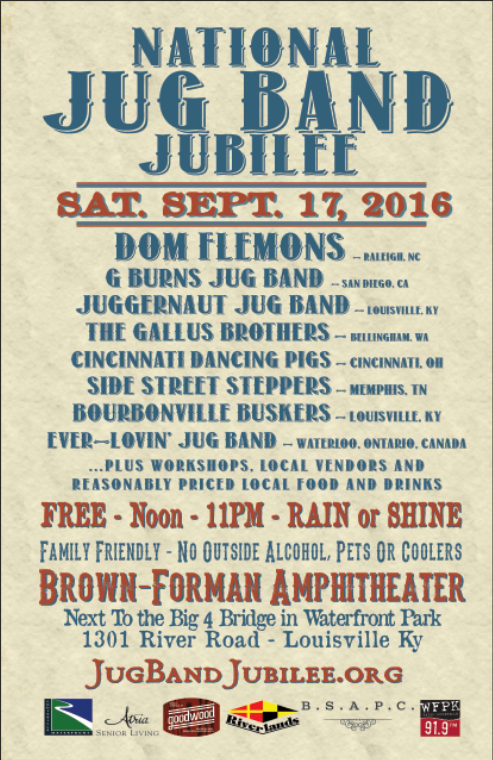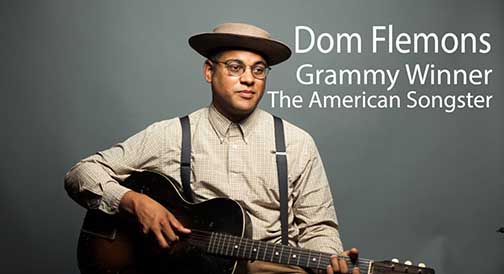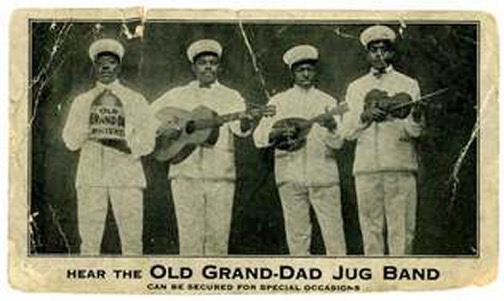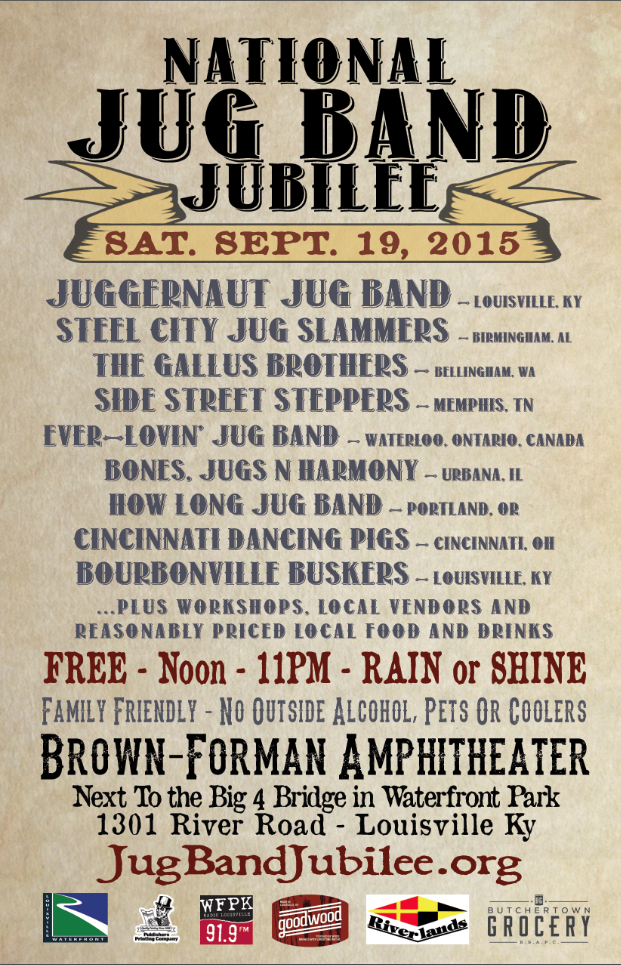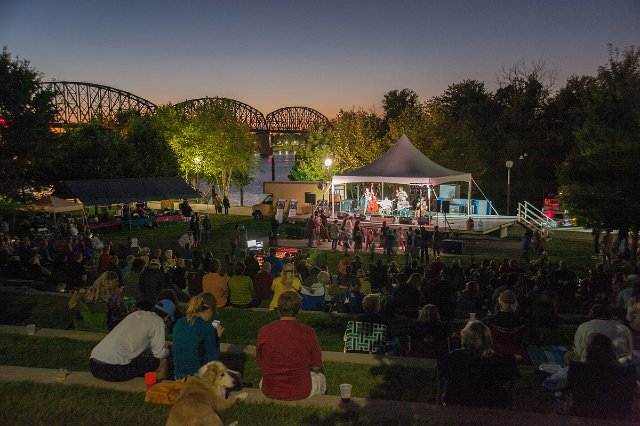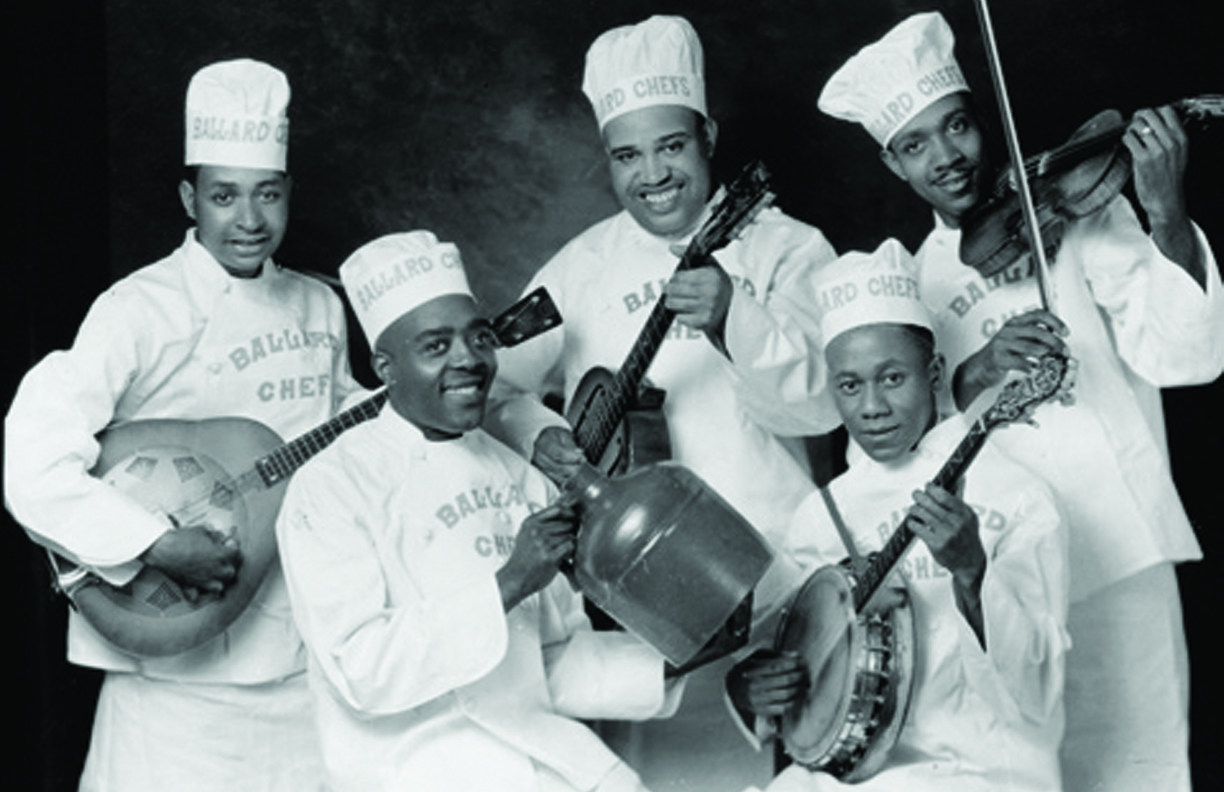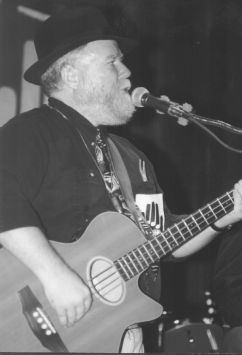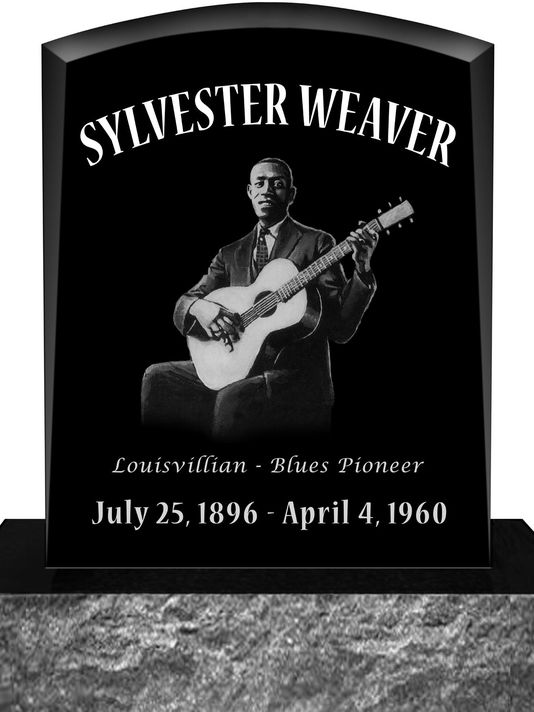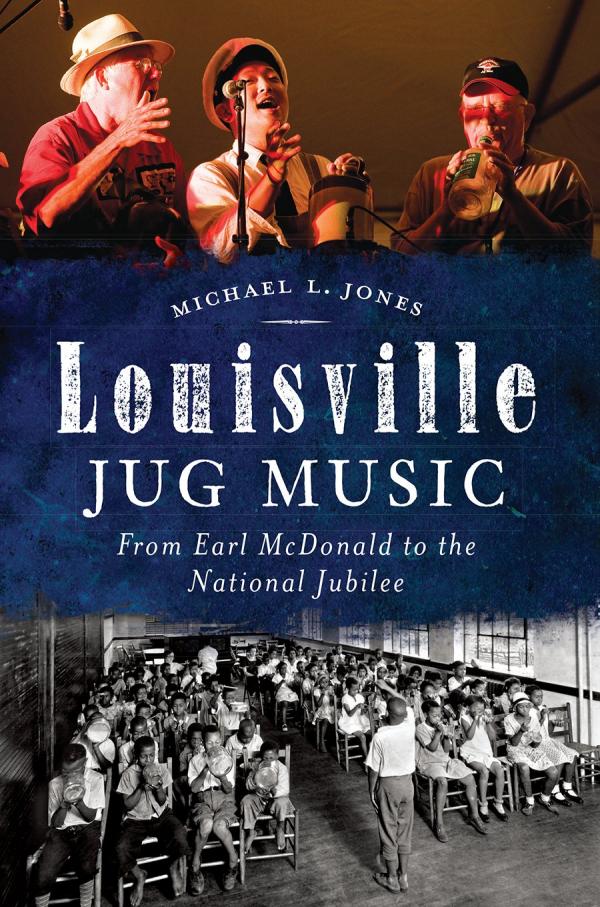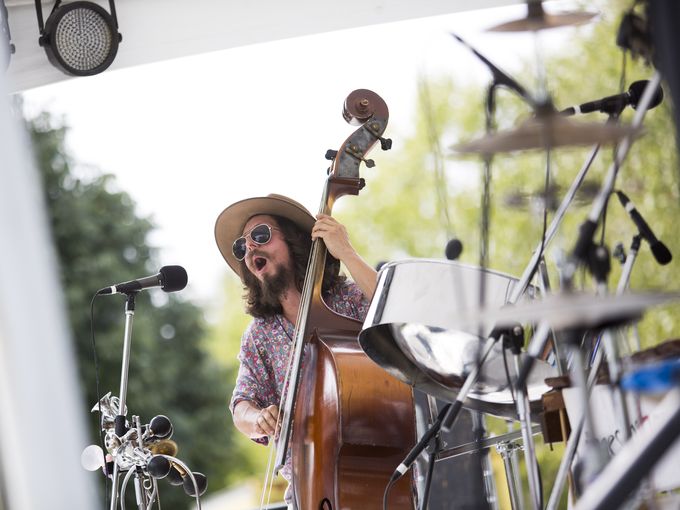A club owner in Bloomington, Ind., hired the Juggernaut Jug Band because she felt her customers wanted a break from the “heavy” music they’d been hearing.
Those customers – if they’ve been force – fed the Curt Kobain – influenced whining that inhabits much of today’s popular music – likely will be caught completely off-guard by the Juggernauts’ retro look, the array of tools with which they attack their craft and their generally positive outlook.
“We are a good-time group,” explained Gil Fish, who plays bass and a handful of other instruments and has been a Juggernaut since 1968. “So much music nowadays is such a downer. It’s full of angst, and this is good-time music.”
Ditto for fiddle player Tin Pan Alan. “So much happens to make you sad. It’s not that we’re trying to block that out – we’re just trying to provide a vacation from it.”
And the 50-year-old Roscoe Goose, who helped form the band around 1965, summed it up this way: “Anybody, even if they’re 90 years old, if they have a kid inside them, they will enjoy this music.”
The band, which includes guitarist Jim Balaya, offered these testimonials in a Subway sandwich shop before a recent show at the Comedy Caravan in the Mid City Mall on Bardstown Road. Early in the conversation one learns that every other word is a wisecrack with this group, but they speak of their craft with genuine enthusiasm and passion.
Once they took the stage, there was no denying that these guys, more than anything, are merely playing music they enjoy, basking in the pleasure they can impart on an audience for about 40 minutes.
Roscoe (they asked that their stage names be used in this article), whose distinguished silver hair and moustache and gray suit threaten to belie his affable demeanor, employs instruments ranging from the traditional jug to a nose flute to a washboard fitted with cans, cow bells and a cymbal.
Gil (or “The Amazing Mr. Fish”), 46, who alternately plucks an acoustic bass guitar and an old-fashioned washtub bass, fills the stage with a Burl Ives-like presence, and Tin Pan, ponytail dangling from beneath his fedora as he fiddles and plays his harmonica, provides an image of what your grandfather might look like if he were a musician.
Then there’s Jim, the band’s “Generation X guitarist,” who at 30, thin and with longish hair, looks as though he would be more comfortable in a video on MTV’s “120 Minutes.”
Not so. “This is very different,” he said when asked why he chose a jug band over something more trendy and more likely to earn money. “I like the music. (The band’s) big slogan is that it’s 1920s rock and roll.”
Actually, the 50-year-old Tin Pan interjected, Jim is merely another middle-aged musician in disguise. “It shows what Geritol will do,” he said.
The audience, as it filed into the club that night, stared in wonder as they noticed Roscoe’s mutant washboard. To the right of the stage, garnering attention as well, hung a “Juggernaut Jug Band” banner complete with the band’s logo – a jug with angel’s wings and an eyeball.
A forest of guitars sprung up from the stage, flanked by various other instruments including Tin Pan’s fiddle and Roscoe’s trumpet.
Onto the stage bounded the four Juggernauts and they opened the show not with some decades-old jug band standard, but with the Doors’ “People Are Strange.” It was quite the effective paradox.
The band also proceeded into versions of the Kinks’ “You Really Got Me” (a work of art which would make Ray Davies proud) and Led Zeppelin’s “Black Dog,” complete with kazoo solo.
“We have fun with them and we love doing them,” Roscoe said of the parody covers, “but it also helps the audience to relate to us.”
The band has also been known to spin a Beatles song and includes “Pinball Wizard” on its regular set list. If nothing else, the band said, it illustrates their diversity.
“Bluegrass bands all play bluegrass music,” said Gil, “but jug bands play anything,”just with jug band instruments.”
Interjected Roscoe, “It’s not just a kitchen band kind of thing, there’s more music going on.”
It’s the spirit of jug band music to play songs from various musical genres, he said. “When (Jerry) Garcia died, the New York Times reviewer said (the Grateful Dead) had a jug band approach to what they did – it was unusual. And it’s fun. The reason you do it is because it’s so much fun to do.”
“It’s post – modern,” quipped Tin Pan. “It’s the music of the future today.”
Even if it isn’t trend-setting, the fun part is certainly true. During “Chicken Pie” (an original written by former Juggernaut “Dr. Don” Oswald), Gil tosses a rubber chicken into the audience. One would think the cost of all those chickens would eat into the band’s profits, but Gil didn’t seem worried: “We’ve started breeding them – it’s easier.”
In fact, he continued, “it’s getting where they’re bringing them to the show and throwing them back.”
And following an adept rendition of Cab Calloway’s “Minnie the Moocher,” the band broke out the “heavy ammo” – namely the novelty instruments – for Balaya’s original, “It’s Like I’m Psychic.” From there they progressed into the frantic “Coney Island Washboard,” where Goose puts his cans and cow bells to the test.
One of the most memorable moments, however, is during the highly improvised rendition of “Pinball Wizard” when Goose swivels his hips and engages the audience with a hyperbolic Elvis Presley impersonation.
As his bandmate gyrates about, Gil informs the audience that they are witnessing “the world’s worst Elvis impersonator … with a wedgie.”
This is Tin Pan’s favorite part of the live show. “It’s funny every time,” he said.
Meanwhile, Elvis – er, Roscoe – said his favorite element to the live show is the adrenaline and chemistry generated within the band.
” … When everything is clicking and we’re all in the groove, playing; when I might forget to sing or play because I’m so caught up in what’s going on.”
It’s hard to believe all this originated with an art form created more than 70 years ago, thanks in large part to horses. The jug band heritage
It was in Louisville in the 1920s when jug band music was born; a blend of Dixieland jazz and blues performed on standard instruments such as the guitar, violin, banjo and mandolin, it introduced into the mix the sound of a piece of pottery – a stoneware crockery jug.
And while it may seem strange or even silly to the untrained eye and ear, it is an instrument that is mastered by its original players just as great pianists and violinists master theirs.
The washboard and even spoons were also popular additions to these bands, who could easily transport these inexpensive and readily available instruments into downtown where they played on street corners to huge acceptance – with the one exception being the police, who didn’t appreciated the traffic jams.
Nevertheless, by 1923 Louisville jug bands were being recorded. Clifford Hayes’ Old Southern Jug Band was one such group, one which included a jug, violin, tenor banjo, six–string banjo and cornet.
The jug was used because of its deep, rich sound, and it set apart those bands which included it in their ensemble. These odd instruments also gave the bands a novelty look, and the players would put on a visual show which matched the stunning musical one.
Much of the success of these jug bands, which began chiefly as a part of black culture, can be attributed to the Kentucky Derby. Each year in May, wealthy people would come to Louisville, bringing their money with them. In an attempt to share in this feast of wealth, musicians would take their show downtown.
Soon, jug bands became almost as much a part of the Derby tradition as thoroughbreds. People holding Derby parties in downtown hotels like the Seelbach would employ these bands to entertain, and there the musicians found much money to be made.
Shows included plenty of fun, dancing, theatrics and humor. Many, if not most, of these bands were comprised of accomplished musicians, which made the entertainment that much better.
The craze quickly spread to Memphis, Tenn., where Will Shade’s Memphis Jug Band, one of the most famous jug bands, was formed. Other famous jug musicians followed, such as Henry Miles, whose Ballard Chefs was so named because they was under contract to the Ballard Flour Mills to promote Obelisk flour, the company’s premium band, according to a 1980 story in the Louisville Courier Journal’s Sunday Magazine. The band consisted of guitar, banjo, violin, string bass and, of course, a jug, which anchored the rhythm section.
This band toured the South, playing to crowds as large as 3,000.
In that Sunday Magazine article, Miles himself recalled some of his greatest peers, including Rudolph Thompson and Earl McDonald, who he called “the king of jug players.”
Unfortunately, this popular music form’s surge began to falter as cities like Louisville became more populated. As street traffic became thicker, the Sunday Magazine article states, motorists more frequently complained to police about the crowds which would gather around jug bands who played on corners.
Critics in the 1940s led a campaign to drive the jug bands away from Fourth Street and Broadway, and musicians, discouraged, moved on to other cities, where they were never met with as much enthusiasm. Eventually, they would pursue other musical interests, those with which they could earn a living, and their jug bands dissipated.
Miles’ band endured, playing into the 1960s, and others sprung up here and there, but jug band music was never the same, especially after the passing of McDonald in 1948 and Rudolph in 1966.
Tom Sobel, a high school friend of Gil and Roscoe and owner of Comedy Caravan, believes jug band music is getting the shaft from the very community in which it was born, especially from local music promoters who don’t provide more of a forum for the musical form.
“I’ve felt for a long time our community should embrace jug band music and its history in the same manner that New Orleans holds Dixieland and Mardi Gras,” said Sobel, a former manager of the Juggernauts. “As Dixieland and Mardi Gras got together, jug bands and Derby go together.
“I’ve been surprised that the community of Louisville has buried and forgotten its rightful place in music history as the birthplace of jug band music. I have met jug bands from all over the United States, and jug bands from all over look at Louisville with a great deal of reverence.”
Even though the musical form is now asleep in comparison with its early success, it has not died, thanks in part to groups like the Juggernaut Jug Band.
“We’re four white guys who are tapped into a black tradition that got going in the ’20s. There’s a rich tradition that nobody really knows about,” said Goose. “To do this now … we’re crusaders, because we love the music.”
In an essay on jug band music penned for Folkways Records in 1963, Samuel Charters wrote “In an important sense … the jug bands and their music will always be part of the American musical scene. They flowered at a time when American folk music was being recorded, when country music and city music of every kind was being released by nearly every record company.
“On the early recordings there is still the sound of the jug band, with all of its swagger, all of its sensitivity, and, in a sense, all of its musical grandeur.”
This, of course, was written with the assumption that, along with the jug band masters, the musical form itself would become extinct. That was exactly two years before Roscoe Goose would discover jug band music.
Along came Roscoe
At age 15, Roscoe (then known as Stuart Helm) was asked by his older brother and his brother’s friends to play washboard in their jug band. He accepted. That group existed for only a year, but three years later high school seniors Roscoe and Dr. Don asked Gil (a.k.a. Steve Drury) to play washtub bass with them in the school vaudeville show.
“I got the bug,” said Fish.
Since then, the Juggernaut Jug Band has taken on several various incarnations. Dr. Don went on to form Dr. Don and the Love Dogs. Roscoe went on hiatus for 14 years while Gil carried the torch with various different members.
Then about three years ago, Sobel asked Roscoe to put together a jug band to play in his club.
The two longtime Juggernauts found Tin Pan Alan, an experienced musician who started out playing folk music on the coffee house circuit back in the 1960s. Jim Balaya was in a rockabilly band known as the Simpletones, and he was introduced to the band by former Juggernaut guitarist Pat Lentz. Balaya’s interest in vintage music styles brought him on board, and the Juggernaut Jug Band of the ’90s was born.
Sobel won’t take any credit for the band’s refocused energy.
“I’ve never played any music – they’re the fellows with the talent. I was just glad to have a venue where the type of kooky crazy funny music they make could be welcomed.”
“The best thing that ever happened was when Tom asked me to put the band back together,” Roscoe was quoted as saying in the band’s press kit. “It was a real struggle for a long time, but it seems that when we got (Alan and Jim) together things have started to click.”
Indeed they have. Over the years, the Juggernaut trail has wandered through 37 states, and the band continues to travel, playing music festivals and state fairs in the East and Midwest. (The band enjoys telling the story of a Dearborn, Mich., outdoor show during which a bird dive-bombed the stage and nearly hit Roscoe in the head. “It was very attracted to shiny objects,” he said.)
And when they’re in town, catch them every Thursday at Comedy Caravan and look for them at local music festivals such as Kentucky Music Weekend, which is held each summer in Iroquois Park.
In August, the band released its first-ever album on compact disc and cassette, a collection called Perhaps You Don’t Recognize Us ….” It was recorded at Ramcat Productions (located on Barrett Avenue in Louisville) and was engineered by Ben Andrews and Sam Gray.
The CD has lent the band another dimension of legitimacy and helped them to book more gigs. Sales, according to Jim, have been “embarrassingly low,” but Roscoe is quick to note that the CD was produced more for promotion than for sales.
“It gives you credibility,” he said.
Added Jim, “It was not a money-making venture.”
The CD, while it cannot hope to capture the band’s theatrical appeal, showcases the band’s musical adeptness, its humor and its sweet vocal harmonies.
And, yes, it includes a variety of instruments, from the jug and washboard to bird whistles and duck calls, not to mention Alan’s violin, Gil’s bass, Jim’s keen guitar and Goose’s impressive range on a number of instruments.
Among the selection are a number of band originals, one of which was written by Jim (“It’s Like I’m Psychic”) and two that came from Dr. Don (“Chicken Pie,” “Drive In Show”). The band agreed it was more devoted to its live show and keeping true to the music’s origins than in writing new material.
“I wrote my mom a letter to tell her I was in a jug band,” said Alan. “That’s all I’ve written.”
Two of the band’s signature parodies – “Black Dog” and “People Are Strange” – landed on the CD, as did a number of jug band music classics. One of those is McDonald’s “Chicken Tree,” which has come to be a jug band standard.
The recording, pristine and energetic as it is, has created another dimension to the band, Jim said. “People that like the CD the most are the ones who have seen us play.”
And that number is growing. It doesn’t hurt that a couple of local radio stations occasionally play the parodies during their morning shows, and the band even did a promo track for NBC.
Not that commercial success is their goal. They each have day jobs – Jim works at Third Planet Music, Alan and Roscoe are jack-of-all-trade handymen, and Gil owns and operates The Hitching Post, a saddle shop in Middletown – and they are intent on sticking to their guns when it comes to paying homage to the music they love so much, right down to wearing hats onstage, a mark of the early jug bands.
Depending on who you talk to, there is also a second reason the Juggernauts don headgear. “When we take off the hats, we can walk about unnoticed,” said Roscoe.
And even though many people aren’t even sure what jug band music is (one of the local music stores even stocked their CD in the “bluegrass” section), they will keep playing it as long as it’s fun. Judging from the fact they’ve been doing it off and on for more than 30 years, chances are the Juggernaut Jug Band will be around for a while longer.
And chances are they still won’t be using their real names.
“I don’t even know their real names,” said Alan, nodding toward his bandmates.
